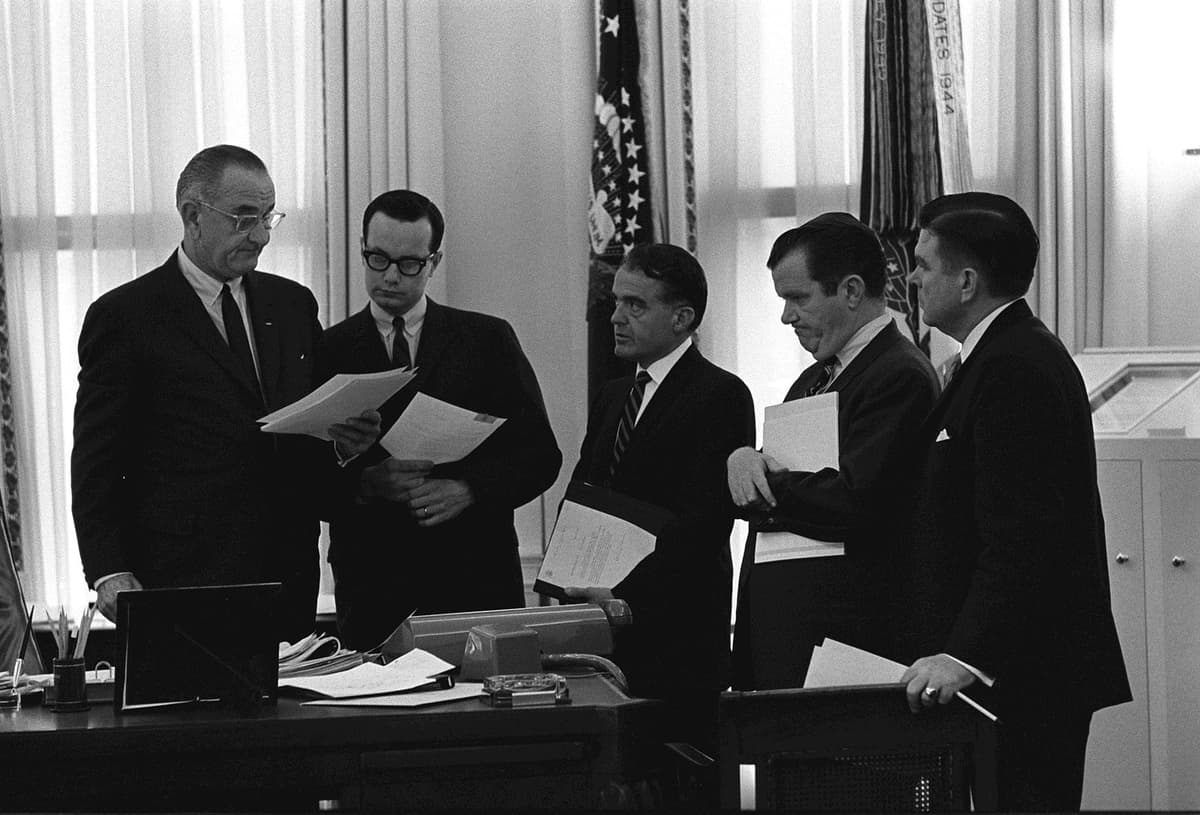Horace Busby: Is This Johnson’s Boswell?
After Robert Caro came calling, the family of President Johnson’s speechwriter went in search of what Busby had left behind, finding to their surprise a work of significant value.

‘The Thirty-First of March: An Intimate Portrait of Lyndon Johnson’
By Horace Busby
University of Texas Press, 296 pages
While you are waiting for the fifth volume of Robert Caro’s biography of Lyndon Johnson, you might want to read, or re-read, the memoir of his speechwriter, first published in 2005 and now re-issued in paperback.
Busby died in 2000, never seeing his book in print, after telling his family he had not finished it and expressing some doubts about its value. Then Mr. Caro came calling and the family went in search of what Busby had left behind, finding to their surprise a work of significant value.
The memoir reads (I have to use the cliché) like a novel. It is an intimate look at a master politician who nonetheless doubted his own judgment and worried that he did not have the education to perform at the highest levels of government. His anxiety increased during his term as vice president and after President Kennedy’s assassination, when brother Robert turned increasingly hostile.
Busby reveals Johnson’s different guises — by turns affable, irascible, unpredictable, distrustful of his own staff, and sometimes so wrought up he went AWOL, with emergency calls sent out to locate the wayward politician.
Busby never claims too much for what he knows. Johnson confided in him, to be sure, but many aspects of the man and politician were never disclosed to Busby. Absent from the memoir is Johnson the conniver and liar who also liked to humiliate staff members. Busby either had the good fortune not to be subjected to this side of Johnson, or the memoirist held back some of what he knew.
The sense we get of Johnson is a man who was always for the common people, an opponent of the oil and gas industry at a time when his anti-corporate opinions were thought to be political suicide in Texas. He thrived by out-campaigning rivals, though Busby is silent about the 1948 election and the story of the stolen votes that made Congressman Johnson a senator.
Johnson was deemed such a maverick in Texas that Busby, in his early 20s, was advised by his college professors not to have any truck with the congressman. Yet several politicians advised Busby to grab the Johnson job offer.
Those recommending Johnson realized that Busby would get a political education like no other precisely because the congressman went against conventional wisdom and found ways to win anyway. This indefatigable politician — never a good reader of speeches — mesmerized large gatherings with extemporaneous diatribes against special interests that he had learned from FDR, who took a liking to the outlandish Texan.
Johnson emulated FDR in his promulgation of government programs, and in private sometimes even donning a pince-nez and mimicking the president’s speech. Like FDR, Johnson adopted an ingratiating tone that often concealed Machiavellian power plays. Busby portrays Johnson histrionics for comic effect, minimizing the dark side of his chief’s duplicity.
The Thirty-First of March is a reference to the day Lyndon Johnson told the American people that he would not run for re-election. Busby supplies virtually an hour by hour account of the days during which many Johnson staffers, friends, and family members tried to talk him out of his decision to quit, as Busby crafted the president’s parting words.
To Johnson, the only way to begin ending the Vietnam war was to take himself out of contention for office. He seemed to realize, as well, that his domestic agenda — so successful in his first two years — had stalled and that he could not take his idea of a Great Society any further.
When a book reads like a novel, you have to ask: Is it a novel? Busby provides many conversations, some of which were based on notes, but in other cases seem to be the result of recollections, of after the fact history.
It is obvious why Robert Caro wanted Busby’s perspective, and it is also apparent why memoirs, as valuable as they may be, cannot be allowed to stand alone as history or biography.
Perhaps Busby worried that his work would be taken as special pleading. Even so, without his eyewitness account — whatever its limitations — our knowledge of Johnson would be for the worse. So it is no bad thing that we have Busby for the defense.
Mr. Rollyson’s work in progress is “Making the American Presidency: How Biographers Shape History.”

